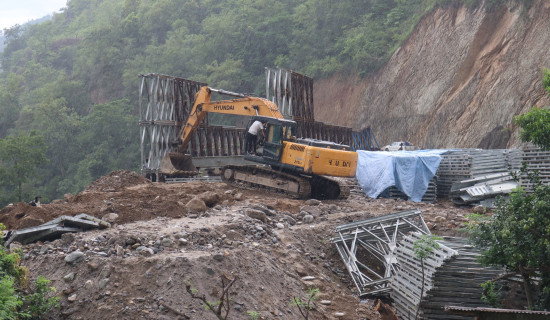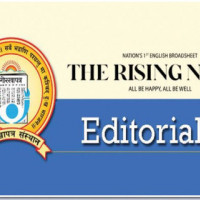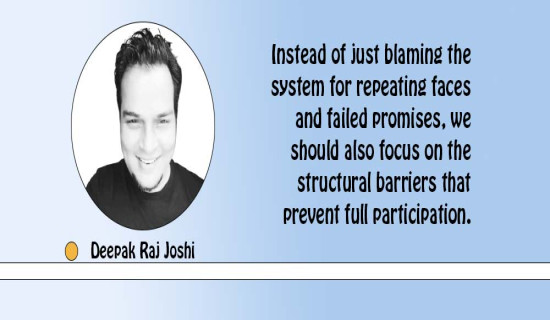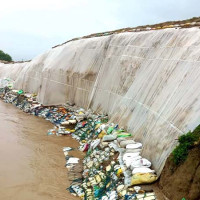- Wednesday, 6 August 2025
Evolving Embryonic Concert Of Powers
The scope of international relations is on the cusp of cataclysmic transformation. The effects of this transformation are seen in altering the power base of global geopolitics affecting international security, politics, trade, technological developments and climate change policies. The central role of three superpowers - USA, China and Russia can reshape this transformation by sharing responsibilities and distributing global public goods so that survival issues are addressed. The global re-configuration of superpowers can be expected to evolve into a new concert, like the historical Concert of Europe, where other powers of different scales revolve around and shore up peaceful coexistence. Their aspiration for national rejuvenation of greatness demands overcoming their security dilemma.
The American and Russian interest to substantially cut defense expenditure and restart arms limitation and nuclear non-proliferation talks can be deemed one step forward in this direction. The other is the Russian opening to American cooperation on rare earth materials and the American strategy to stop offensive cyber operations against Russia. Both have shared interest in the mutual reduction of defense budget and uses of surpluses for infrastructural progress. Still, the third is the Chief of the Government Department of Efficiency Elon Musk’s support to Republican Senator Mike Lee’s account for the US withdrawal from NATO and the UN, the last one is the only leg of global governance.
Drain on US taxpayers' money
But the US considers it anti-American, inept and a drain on US taxpayers' money. It may be pleasing to Russia, facing challenges from both. But under multipolar world order various scales of powers with their differing capabilities and aspirations entail them to build a robust consensus on a global social contract to regulate the conduct of various actors, steer digital transformation, avoid rifts among them and with other actors, settle meta issues including energy transition through negotiations and mitigate risk producing causes such as arms race and nuclear proliferation. There are some vital concerns for such a concert of great powers to evolve.
First, the new concert of super powers enables each of them to coordinate goals, strategies, and actions, keep the balance of interests, and comply with international law to mitigate conflicts. Concert becomes inoperative if trust is deficient owing to exclusive national interest-based policy. The current US-Russia resetting of ties and American pivoting to Eurasia is based on American interest to ensure peace in Ukraine and access its rare earth elements, which the latter has consented for its security, survival of Israel in a hostile geopolitical milieu, de-escalate conflict in the Middle East and de-nuclearise Iran and North Korea. The Russian goals are to curb Ukraine’s interest to join NATO, hold its control in Crimea and part of Ukraine and foil NATO’s probable offensive.
The London meeting of European leaders has planned to build a unified position on war-torn ally Ukraine’s survival, integrity and sovereignty through the Rearm Europe Plan. It has prepared a peace plan to support its security and development and submit to the US President even if the US withdraws from its commitment to trans-Atlantic security. They agreed on the British proposal to keep the flow of military, economic and humanitarian aid to Ukraine, ensure Ukraine’s participation in the peace process, boost its defensive capabilities and evolve a “coalition of willing” to defend the peace deal. Europe’s continuous economic pressure on Russia is mutually hurting. The Ukrainian President Volodymyr Zelensky wants the American role in the peace deal and security to ward off future Russian threats.
It has a greater stake in checking Russia through its European-scale security architecture, democracy, trade and nuclear order than stopping wars in the Middle East. American and Israeli support for Russia in the UN voting explains the shifting perception. The Global South’s moral support for Ukraine in voting has also declined. The much-vaunted US President Donal J. Trump-Zelenskyy meeting at the White House ended in a fracas without any tangible progress in the peace deal despite the good offices of the UK and France struggling to yield positive payoffs. America’s neutrality between Russia and Ukraine and suggestion to the latter to convert its grant into loans is the high price. Its policy towards Mexico and Canada opened them to deeper economic cooperation with China, including the production of EVs, much to the dismay of America.
This is altering the regional balance of power. China has maintained mutually beneficial cooperation with North American, Latin American and African nations, respecting their sovereignty. It opposed the Sino-phobic critics’ perception of China’s evolving ties with African nations based on an extractive model, not capacity building. Upon the US pressure, however, Panama showed its willingness to toe the American line, declaring not to renew its involvement in the Belt and Road Initiative (BRI).
Second, a web of multilateral accords allows super and medium powers' mutual calculation of benefits and stitch small powers to the concert norms, values, institutions and procedures. The evolving multilateral initiatives of the Global South and many nations’ support to the UN show the rationale of a concert as a mutual help in an uncertain world where the US is withdrawing from many of its humanitarian agencies. Third, growing interdependence on commerce, trade and technology, climate change and connectivity can help each to use diplomacy against war and adopt a win-win strategy. China’s ties with the USA, Russia, Europe and the Global South are not based on decoupling but shared interests despite tariff wars.
US President Trump does not share the perception of Europe deeming Russia a threat because Europe’s GDP, population and military muscle are bigger than Russia's. But he thinks that the EU is created to screw America, imposing unfair security and economic burden. Trump knows that the US ties with China are vital to world politics and many nations of Asia, Africa and Latin America are deferential to its ascent as a power with rich innovation, connectivity, outreach and initiatives, and mutual investments essential for sustainable development. However, he does not want China to hold primacy in Asia where American guidance to Japan, South Korea, India, Australia, Philippines, and Vietnam can work as a countervailing power.
Still, American allies in Asia are less sure of US commitment. Peter Navarro, one of the US president’s advisers, has exerted pressure on President Trump to expel Canada from the Five Eyes — a security alliance of English-speaking nations. Israel, the lynchpin of America’s Middle East policy, has suggested that India buy American fighter Planes F-35 and that the US expel Turkey from NATO. India hopes that President Trump will likely focus on QUAD to counterbalance China. Both sides have agreed to collaborate on the India-Middle East-Europe Economic Corridor, establish an Indian Ocean Strategic Venture, create new multilateral agreements in Western Indian Ocean, West Asia and Indo-Pacific and deepen defense cooperation.
But to make India great again, it continues to adopt the multi-alignment policy and strategic partnership with Russia, Europe and the Gulf nations. The Unilateral imposition of tariffs by the USA can unravel the rule-based global economic order defined by the World Trade Organisation (WTO). The powerful trading nations can use their leverage and interests where smaller nations like Nepal have to face a condition without choice. The non-participation of the USA in recent G20 foreign minister meetings led some analysts to speculate that it might pull back from the World Bank and the IMF or even invite the participation of Russia in all international regimes where it was earlier denied, including the G7. In either case, the value of the New Development Bank of BRICS will grow despite the threat of the USA to impose 100 per cent tariffs to nations resorting to de-dollarisation.
Fourth, the formulation of a common set of rules as per concert architecture can foster predictability of behavior of nations and other actors than absolutely geopolitically driven conduct where each actor prefers absolute gain at the cost of others and creates a security dilemma, thus making cooperation hard to pursue. Finally, the action-reaction mode of international relations so far has created vicious distrust and conflict, such as the Arab-Israeli conflict and Europe-America, Europe-Russia and Iran-America tensions. The transformation of vicious conflicts into virtuous peace requires legitimate representation of interests of all sides in the concert and the use of diplomacy to avoid conflict. The sharing of proportional benefits can endure the concert mold of the global system.
The US's advice to Europe to share the burden of defense of NATO and reciprocal tariffs can ensure stability in their ties. But the EU nations have decided to counter the 25 per cent US tariffs on European products and claim to become independent of the USA. European prosperity based on its American security, advanced technology, cheap Russian energy, labour from Eastern Europe and market access to China has been upended. Its scarcity of energy can hit its manufacturing sector. Now, Europe is expanding its ties with Asian and Latin American nations. Following a deviation from Ostpolitik, the German public is split between those favouring détente with Russia, especially the far-right party AFD, which wants to rebuild ties with Russia and import energy, while others prefer the security of Ukraine.
Peace forces
Europe’s enthusiasm to supply peace forces in Ukraine after the ceasefire and peace deal may spell the fear of Russia, which wants long-term mitigation of all the sources of wars. Following the Western economic sanctions, Russia swiftly pivoted to Asia-China, India, Turkey, Iran and North Korea and improved ties with African and Latin American nations. Nepal is heavily penetrated by the international regime. It is, therefore, vulnerable to external policy changes, especially the suspension of American aid. It has to invent a balancing way to navigate in times of uncertainties of aid and foreign investments and certainty of trade deficits, growing debt and dependence.
Nepal seems to be at the margin of these global geopolitical changes. Many of its previous assumptions about externally driven neo-liberal regime change, security, development and regime-oriented foreign policy, deeming them the best model, are under critical scrutiny. It has to reduce external dependence through productive investment in the real economy, which can contribute to poverty alleviation, job creation and social integration, infrastructural growth, connectivity, education and health and evolve institutional and leadership efficiency in statecraft and safe adaptation in international politics.
(Former Reader at the Department of Political Science, TU, Dahal writes on political and social issues.)

















